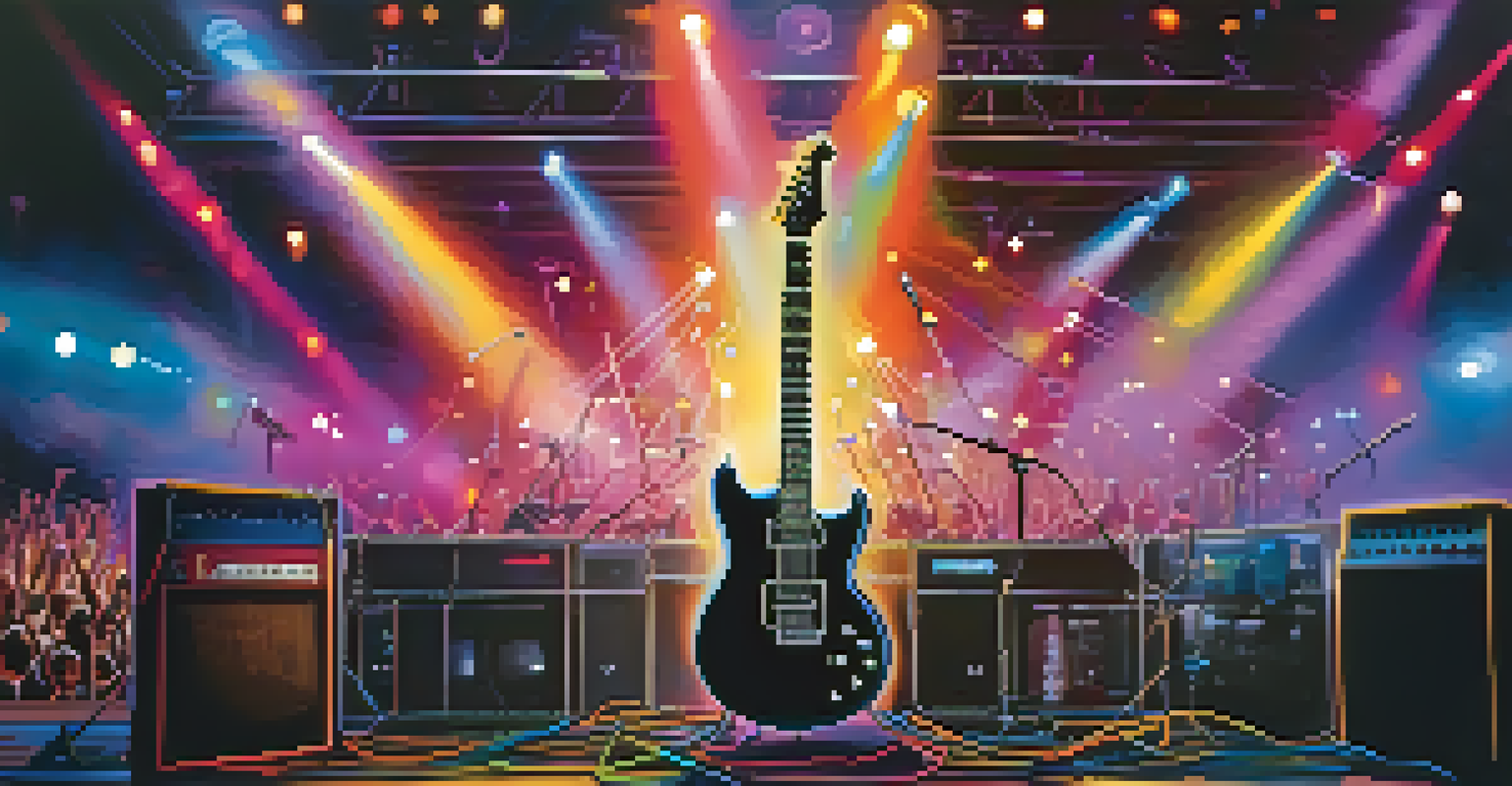Blues to Rock: The Guitar's Role in Genre Evolution

The Birth of the Blues: Guitar's Initial Influence
The blues genre emerged in the late 19th century, rooted in African American musical traditions. The guitar quickly became the backbone of this genre, providing a rhythmic and melodic foundation that was both expressive and relatable. Artists like Robert Johnson showcased the guitar's ability to convey deep emotion and storytelling, making it an essential tool in blues music.
The blues is like a dream. You can’t really explain it, you just have to feel it.
This era saw the rise of the acoustic guitar, which allowed musicians to perform in various settings, from juke joints to street corners. By using techniques like fingerpicking and slide guitar, blues artists created a sound that resonated with the struggles and triumphs of everyday life. The guitar's versatility made it an ideal instrument for conveying the raw, authentic feelings that defined the blues.
As blues music spread across the United States, it began to influence other genres, laying the groundwork for what was to come. The guitar, with its unique sound and expressive capabilities, became a staple for many musicians, setting the stage for an exciting evolution in music.
From Blues to Rock: The Transition Begins
The transition from blues to rock music began in the 1950s, as artists sought to blend the soulful sounds of the blues with new rhythms and styles. Rock and roll pioneers like Chuck Berry brought the guitar to the forefront, using it to create catchy riffs and energetic solos that captivated audiences. This shift marked a significant moment in music history, as the guitar became a defining element of rock music.

Berry's innovative techniques, such as his signature duck walk and powerful chord progressions, showcased the guitar's potential for both rhythm and melody. His influence inspired countless musicians, paving the way for future guitar legends. The electric guitar, in particular, allowed for greater sound manipulation, leading to the creation of iconic rock sounds.
Guitar's Roots in Blues Music
The guitar emerged as a foundational instrument in blues music, allowing artists to express deep emotions and storytelling.
As rock music evolved, it began to incorporate elements from various genres, including jazz, country, and folk. The guitar remained a central instrument, adapting to these changes and helping to shape the identity of rock music.
Electric Guitar Revolution: A Game Changer
The invention of the electric guitar in the 1930s was a turning point for music, especially for the blues and rock genres. With its ability to amplify sound and create new effects, the electric guitar opened up a world of possibilities for musicians. Artists like B.B. King and Jimi Hendrix pushed the boundaries of guitar playing, using distortion and feedback to create unique sounds that captivated listeners.
The electric guitar is a symbol of freedom and self-expression.
This new technology allowed for greater expression and creativity, leading to the development of various guitar techniques such as shredding and tapping. The electric guitar became synonymous with rock music, as bands began to rely on its powerful sound to energize their performances. The instrument was no longer just a background tool; it became the star of the show.
As rock music continued to evolve throughout the decades, the electric guitar remained at the forefront, influencing the development of sub-genres like punk, metal, and grunge. Its adaptability ensured that it would continue to play a vital role in the music world.
Iconic Guitarists: Influencing Generations
Throughout the evolution of rock music, numerous guitarists have emerged as icons, leaving their mark on the genre. Figures like Eric Clapton, Jimmy Page, and Eddie Van Halen not only showcased incredible technical skill but also brought their unique styles to the forefront. These artists inspired countless aspiring musicians, demonstrating the power of the guitar in shaping rock music.
Clapton's blues-infused rock, Page's intricate solos with Led Zeppelin, and Van Halen's innovative techniques all contributed to the guitar's evolution. Each of these musicians pushed the boundaries of what was possible on the instrument, encouraging future generations to explore their creativity. Their influence can still be felt today, as new guitarists draw inspiration from their work.
Electric Guitar Transforms Rock
The invention of the electric guitar revolutionized music, enabling musicians to explore new sounds and techniques in rock.
The legacy of these iconic guitarists highlights the guitar's role as a driving force in rock music, proving that it is more than just an instrument—it's a means of expression and connection.
The Role of Technology: Effects and Innovations
As rock music progressed, technological advancements played a crucial role in shaping the guitar's sound and capabilities. Effects pedals, amplifiers, and digital technology allowed musicians to experiment with their tone and style in ways that were previously unimaginable. This evolution opened the door to new genres and sub-genres, further expanding the guitar's influence in music.
For instance, the use of overdrive and distortion pedals became a staple for rock guitarists, enabling them to create powerful, gritty sounds that defined the genre. The introduction of modeling technology in the digital age allowed musicians to replicate the tones of legendary guitarists, making it easier for them to experiment with different sounds. This adaptability ensured that the guitar remained relevant in the ever-changing music landscape.
Moreover, the rise of home recording technology allowed musicians to produce their own music, leading to an explosion of creativity in the rock genre. The guitar flourished in this new environment, proving that it could evolve alongside technological advancements while remaining deeply rooted in its blues origins.
Blending Genres: The Guitar's Versatility
One of the most remarkable aspects of the guitar is its versatility, which has allowed it to transcend genres and adapt to various musical styles. Today, the guitar can be found in everything from pop and country to hip-hop and electronic music. This blending of genres has led to innovative new sounds and styles, showcasing the guitar's ability to evolve continuously.
Artists like John Mayer and Hozier have successfully incorporated guitar-driven elements into their music while drawing from blues, rock, and folk influences. This blending of styles demonstrates how the guitar can serve as a bridge between genres, allowing musicians to express themselves in unique ways. The guitar's adaptability ensures its relevance in an ever-changing musical landscape.
Guitar's Versatility Across Genres
The guitar's adaptability has allowed it to blend seamlessly into various musical styles, from pop to hip-hop, ensuring its continued relevance.
As musicians continue to explore new sounds and styles, the guitar remains a central instrument in the creative process. Its ability to complement various genres solidifies its position as a cornerstone of modern music.
The Future of the Guitar: Trends and Predictions
Looking ahead, the future of the guitar appears bright, with new trends and innovations on the horizon. As technology continues to advance, we can expect to see even more creative ways for musicians to utilize the guitar. From augmented reality apps to AI-driven music creation, the possibilities for guitarists are expanding rapidly, promising exciting developments in the years to come.
Additionally, the resurgence of vinyl and live music experiences indicates a renewed appreciation for the guitar's role in music. As audiences seek authentic connections with artists, the guitar remains a powerful symbol of that connection. Emerging artists are likely to continue drawing inspiration from both blues and rock traditions while infusing their unique perspectives into their music.

Ultimately, the guitar's ability to evolve and adapt ensures its place in the future of music. As new generations of musicians pick up the instrument, the legacy of the guitar will continue to shape the sound of music for years to come.